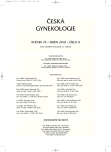Doporučení k provádění prevence RhD aloimunizace u RhD negativních žen
Guideline for prevention of RhD alloimmunization in RhD negative women
Events following which anti-D immunoglobulin should be given to all RhD negative women with no anti-D antibodies: First trimester indications (50 μg) - termination of pregnancy, spontaneous abortion followed by instrumentation, ectopic pregnancy, chorionic villus sampling, partial molar pregnancy; Second and third trimester indications (100 μg) – amniocentesis, cordocentesis, other invasive prenatal diagnostic or therapeutic procedures, spontaneous or induced abortion, intrauterine fetal death, attempt at external cephalic version of a breech presentation, abdominal trauma, obstetric haemorrhage; Antenatal prophylaxis at 28th weeks of gestation (250 μg); Delivery of an RhD positive infant * (100 μg); Minimal dose: before 20 weeks gestation - 50 μg (250 IU), after 20 weeks gestation ** - 100 μg (500 IU); Timing: as soon as possible, but no later than 72 hours after the event. In cases where prevention of RhD alloimmunization is not performed within 72 hours of a potentially sensitising event, it is still reasonable to administer anti-D immunoglobulin (IgG anti-D) within 13 days, and in special cases, administration is still recommended up to a maximum interval of 28 days postpartum.; FMH (fetomaternal haemorrhage) - If the amount of fetal erythrocytes which entered the maternal circulation is quantitatively determined, administration of 10 μg IgG anti-D per 0.5 ml of fetal erythrocytes or 1 ml of whole blood is indicated.
*also if the RhD type of the infant has not been determined or is in doubt, **in conjunction with a test to assess the volume of any fetomaternal hemorrhage.
Authors:
M. Lubušký 1,2; M. Procházka 1; O. Šimetka 3; I. Holusková 4
Authors‘ workplace:
Porodnicko-gynekologická klinika LF UP a FN Olomouc, přednosta doc. MUDr. Radovan Pilka, Ph. D.
1; Ústav lékařské genetiky a fetální medicíny LF UP a FN Olomouc, přednosta prof. MUDr. Jiří Šantavý, CSc.
2; Porodnicko-gynekologická klinika FN Ostrava, přednosta MUDr. Ondřej Šimetka
3; Transfúzní oddělení FN Olomouc, přednosta MUDr. Dana Galuszková, Ph. D., MBA
4
Published in:
Ceska Gynekol 2010; 75(4): 323-324
Overview
Events following which anti-D immunoglobulin should be given to all RhD negative women with no anti-D antibodies: First trimester indications (50 μg) - termination of pregnancy, spontaneous abortion followed by instrumentation, ectopic pregnancy, chorionic villus sampling, partial molar pregnancy; Second and third trimester indications (100 μg) – amniocentesis, cordocentesis, other invasive prenatal diagnostic or therapeutic procedures, spontaneous or induced abortion, intrauterine fetal death, attempt at external cephalic version of a breech presentation, abdominal trauma, obstetric haemorrhage; Antenatal prophylaxis at 28th weeks of gestation (250 μg); Delivery of an RhD positive infant * (100 μg); Minimal dose: before 20 weeks gestation - 50 μg (250 IU), after 20 weeks gestation ** - 100 μg (500 IU); Timing: as soon as possible, but no later than 72 hours after the event. In cases where prevention of RhD alloimmunization is not performed within 72 hours of a potentially sensitising event, it is still reasonable to administer anti-D immunoglobulin (IgG anti-D) within 13 days, and in special cases, administration is still recommended up to a maximum interval of 28 days postpartum.; FMH (fetomaternal haemorrhage) - If the amount of fetal erythrocytes which entered the maternal circulation is quantitatively determined, administration of 10 μg IgG anti-D per 0.5 ml of fetal erythrocytes or 1 ml of whole blood is indicated.
*also if the RhD type of the infant has not been determined or is in doubt, **in conjunction with a test to assess the volume of any fetomaternal hemorrhage.
Doporučení k provádění prevence RhD aloimunizace je zpracováno v souladu s poznatky Evidence Based Medicine a výsledky řešeného grantového projektu „Incidence, objem a rizikové stavy fetomaternání hemoragie při porodu“.
Schváleno výborem ČGPS ČLS JEP dne 3. 6. 2010.
Události, při kterých by měl být podán anti-D imunoglobulin RhD negativním ženám, nejsou-li u nich již přítomny protilátky anti-D:
- Indikace v 1. trimestru (50 μg):
- umělé ukončení těhotenství,
- samovolný potrat s instrumentální revizí dutiny děložní,
- operace mimoděložního těhotenství,
- biopsie choria z genetické indikace,
- evakuace molární gravidity.
- Indikace ve 2 a 3. trimestru (100 g):
- amniocentéza,
- kordocentéza,
- jiné invazivní výkony prenatální diagnostiky a fetální terapie,
- indukovaný abort,
- intrauterinní úmrtí plodu,
- pokus o zevní obrat konce pánevního,
- břišní poranění,
- porodnické krvácení.
- Antepartální profylaxe ve 28. týdnu (1 x 250 μg)
- Porod RhD pozitivního plodu * (100 μg)
Minimální dávka:
- před 20. týdnem těhotenství 50 μg (250 IU)
- po 20. týdnu těhotenství ** 100 μg (500 IU)
Načasování: co nejdříve ale nejpozději do 72 hodin po události.
Při opomenutí provedení prevence RhD aloimunizace do 72 hodin po potenciálně senzibilizující události má ještě smysl podat IgG anti-D do 13 dní, v mimořádných případech je doporučeno podání s odstupem maximálně 28 dní po porodu.
FMH (fetomaternání hemoragie)
Je-li provedeno kvantitativní stanovení množství fetálních erytrocytů proniklých do oběhu matky, je indikováno podání 10 μg IgG anti-D na 0,5 ml fetálních erytrocytů nebo 1 ml plné krve.
Vysvětlivky
* i v případech, kdy RhD fenotyp plodu není znám
** současně by měl být stanoven objem fetomaternální hemoragie (FMH) k upřesnění dávky
Podpořeno grantem IGA MZ ČR NS-10311-3/2009.
Doc. MUDr. Marek
Ľubušký, Ph.D.
Porodnicko-gynekologická
klinika
FN
Olomouc
I. P. Pavlova
6
775
20 Olomouc
Sources
1. Ľubušký, M. Prevence RhD aloimunizace. Evidence Based Medicine a přehled doporučených postupů. Postgrad Med, 2010, 12 (2), s. 194-198.
2. Ľubušký, M. Prevence Rh (D) aloimunizace u Rh (D) negativních žen. Prakt Gyn, 2008, 12 (2), s. 100-103.
3. Ľubušký, M., Procházka, M., Krejčová, L., et al. Prevence Rh (D) aloimunizace u Rh (D) negativních žen v těhotenství a po porodu Rh (D) pozitivního dítěte. Čes Gynek, 2006, 71 (3), s. 173-179.
Labels
Paediatric gynaecology Gynaecology and obstetrics Reproduction medicineArticle was published in
Czech Gynaecology

2010 Issue 4
Most read in this issue
- Dystokie ramének plodu při vaginálním porodu
- Sutura ruptury perinea 3. a 4.stupně
- Perinatální paréza brachiálního plexu
- Komplikace radikálních onkogynekologických operací
